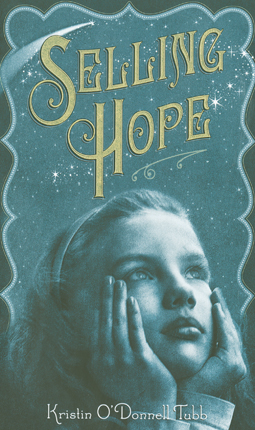Full Text Reviews: Booklist - 11/15/2010 *Starred Review* In 1910, Halley’s Comet caused quite a pandemonium. Thirteen-year-old Hope, a smart and smarty-pants heroine, travels the country on the low-level vaudeville circuit with her magician dad, but she desperately wants to ditch the show and stay in Chicago. To do that they’ll need money, and in a flash of inspiration, Hope whips up a side business selling “anti-comet” pills (thinly disguised mints) to hysterical people convinced the comet will bring any number of horrendous calamities with it. She gets help from another kid in the show, Buster Keaton, who, aside from being adept at slapstick, is handy at bringing a blush to Hope’s cheeks. Tubb deftly ingrains a thoughtful ethical question into the story (is Hope really helping people by assuaging their fears or simply ripping them off?) but never overdoes it in this bouncy tale populated by a terrific cast of characters. The well-synthesized period flavor extends right down to the one-liners that punctuate Hope’s earnest, easygoing, and perfectly pitched narration (“This morning’s gravy was so thick, when I stirred it, the room spun around!”). In the end, though, it’s Hope’s relationship with her father—a sort of proto-hippy-dippy naturalist who often seems more of a child than Hope—that steals the spotlight with a gentle and well-earned tug of the heartstrings. - Copyright 2010 Booklist. Bulletin for the Center... - 12/01/2010 Her father’s job as a vaudeville magician has kept Hope McDaniels on the road for much of her thirteen years, and she wants nothing more than to settle down in a real home, attend a real school, and make some real friends. The imminent arrival of Halley’s Comet, due in a mere seventeen days-May 18, 1910-may just be her ticket to better times. Mass anxiety over the comet’s threat to life on Earth is steadily rising to hysteria, and Hope, no stranger to vaudeville-style flimflam, seizes the opportunity to raise a few month’s rent by selling “anti-comet pills” (paste-covered Sen Sen breath mints) to gullible people desperate for deliverance. Assisted by young fellow vaudevillean Buster Keaton, Hope watches the quarters roll in, but whether she can convert her riches to a stable lifestyle depends largely on her ability to shield the operation from the unscrupulous road manager and convince her father to leave his act, which has become surprisingly successful now that he has incorporated patter (which he truly believes) encouraging the audience to use their collective will to alter the course of the comet. Even though readers will anticipate the benign outcome of the fateful date, they’ll find themselves drawn in by the countdown to possible doom and intrigued by Tubb’s subtle examination of the fine line between offering hope and dealing deceit. Kids bemused by the notion of mass panic might want to ask their parents what they did to prepare for the turn of the millennium. EB - Copyright 2010 The Board of Trustees of the University of Illinois. School Library Journal - 12/01/2010 Gr 5–8—Magician Nick McDaniels and his 13-year-old daughter have been on the vaudeville circuit ever since his wife died. Spending her time on trains and in grubby boardinghouses, Hope longs to settle down in Chicago, their hometown, and desperately wishes for a blue notice telling them that their magician act is no longer wanted, but how would they support themselves? She needs money to tide them over until her father finds another line of work. In May 1910, Earth is about to pass through the tail of Halley's Comet, and people are panicked. With the help of Buster Keaton, a lanky boy also on the circuit, Hope hatches the idea of selling anti-comet pills to gullible "Coins," who will do anything to save themselves. Tubb uses rich historical material well in this clever story whose time line is a 17-day countdown to the comet catastrophe. Not only are Keaton and his family part of the scene, but so are Bert Savoy, a comedian in drag; Benjamin Franklin Keith, an impresario; and the Cherry Sisters, a dull act regularly pelted with rotten fruit. Wisecracks, most of them vintage, are interspersed in a way that makes readers feel Hope is muttering them in response to what is happening. In this lively first-person tale, Hope isn't always completely believable because the language and vocabulary of her internal thoughts are sometimes too adult for a girl her age, even one with a father who spouts Walt Whitman. Still it's a good show with heroes, villains, and heart.—Barbara Scotto, Children's Literature New England, Brookline, MA - Copyright 2010 Publishers Weekly, Library Journal and/or School Library Journal used with permission. Loading...
|



